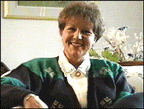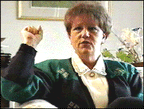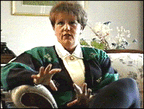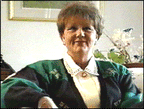![]() Listen
to Maggie share a cancer experience in her own words. (420 K .au
file)
Listen
to Maggie share a cancer experience in her own words. (420 K .au
file)

Maggie was 41 years old when she was diagnosed with invasive breast cancer. Her surgery and chemotherapy went well, and four years later she elected to have reconstructive breast surgery. However, the cancer has come back and Maggie is preparing for a bone marrow transplant.

Maggie had gone in for a routine mammogram when she was told that she had an abnormality. The lump was found on a Friday, and the biopsy surgery was scheduled for the following Wednesday. Maggie did not know if she would have her breast when she awoke from the biopsy.

Maggie had no time to discuss her options with her doctor. The biopsy showed the tumor was cancerous and she immediately had a mastectomy. She wondered if she would have chosen a different option if she had taken more time to evaluate her condition. Her surgery was followed by chemotherapy. Four years later, she had reconstructive surgery.

Maggie believes that recovery is helped by a positive mental attitude and support. She found support through her family, friends, and a breast cancer support group in her community.
Maggie's Introduction: It's different after you face it
When you're told that you have cancer, you face the possibility
that you're going to die. People always say, well, all of us face
that possibility. You could step off a curb and be hit by a car. But
it's different. I've already been hit by the car. I'm just wondering
if it's going to come back and get me again. And when you've actually
faced the reality that you could die, it does make you look real hard
at your life. It does make you treasure things a lot more. All the
trite things that you hear about smell the roses, those things become
very, very real. They're not as trite as they seem.
Maggie's Introduction: My life is very good
If I knew that I was going to die in six months, I probably
wouldn't do anything different than what I'm doing now. My life is
really good. One of the nice things about not having to work right
now, (because I'm getting some more therapy and I'm staying home), is
that I have this time to be with my family, to do things for them and
to do things with them, and I'm really enjoying that. But I also
enjoy my job and I think, gee, if I went back I think my job would
have new meaning because of what I've been through.
Maggie's Introduction: My daughters were angry
I do need a lot of support and I felt that my family needed it,
too. I have two daughters. With daughters especially, this is a very
sensitive issue. My oldest daughter was about 13 when I was first
diagnosed with cancer, and she was very angry with me. It made it
even harder for me to cope with because she was so angry at me. She
didn't want to talk about it. She would say things that would kind of
hurt us both. And then as I finished treatment, what finally came out
is that she was afraid that this would happen to her. And I can't
tell her that it won't. You know, that's the hard thing. I can't say
well you don't need to worry about it. Now that I'm going through all
this for a second time, my youngest daughter is 13, and so we're
going through a very similar thing. She's angry, she doesn't like to
talk about it. She's not particularly sympathetic. But we've tried to
emphasize the positive and talk about the fact that so much research
is going. And, it's been very difficult for my husband, but he's
tremendously supportive.
Maggie's Introduction: It changes your priorities
It does change your life and I think it changes it in positive
ways. You do start to prioritize. You start to get rid of some of the
garbage in your life. If you don't want to do something, you learn to
say no. You don't have to make excuses any more. You just put aside
the things that aren't important and you concentrate on the things
that are. In my case, it's my family and also myself. Doing things
that I want to do, doing things that make me happy. I think women are
infamous for always putting everybody else first, and I did that for
a long time. And when I was diagnosed with cancer and I was going
through chemotherapy, I thought, why am I still doing all the
laundry? Why am I struggling up and down the stairs with these
laundry baskets? Why am I still making the kids' lunches when they're
old enough to do that themselves? So I started saying "Its time you
guys took over some of these things." You start looking after
yourself.
![]() Return
to Maggie's Outline
Return
to Maggie's Outline
Maggie's Diagnosis: I wasn't surprised
I wasn't 100% surprised. I had been having problems with lumps for
a few years. Fibrocystic disease. And I had seen my family physician
and he had referred me to a surgeon. So whenever I discovered a lump,
I would go in and visit the surgeon and he would check it out. I
think in the back of my mind, I was aware of breast cancer. I was
doing all the right things, you know, getting mammograms regularly,
but when it actually happened, there was a little part of my mind
that said well, you know, every time you went you were kind of
prepared for that to occur.
Maggie's Diagnosis: I didn't know my family history
I'm adopted so family history was really not an issue with me. It
would have been helpful to know a little more about my family
history, to know if this was something that ran in the family, but I
would have worried about it more. As it was, I didn't until it
happened.
Maggie's Diagnosis: They took 17 lymph nodes
They take the lymph nodes out too find out how far your cancer
got, if the lymph nodes are full of cancer. Every one they took out
has cancer, that means you're pretty late stage and they give you a
different dosage of chemotherapy. Mine was sterile. I was lucky. That
took seventeen out, none of them had cancer. So it didn't spread to
the lymph nodes. Lymph nodes are the first station they go, the first
stop they will spread to. So that's good news.
Maggie's Diagnosis: Younger women are diagnosed
What I'm seeing as I've become more involved with this is that
more and more young women are being diagnosed. This is no longer a
disease for women who are 50 or older. We have women on our support
group who are in the early 30's who have been diagnosed with breast
cancer.
![]() Return
to Maggie's Outline
Return
to Maggie's Outline
Maggie's Treatment: I felt rushed
A lot of women, their physicians make them feel rushed. Like,
we've discovered this lump. You've got to go in right now and have
this taken care of, you know. We're going to do a mastectomy
immediately. This happened to me. I was diagnosed on a Friday and
surgery was scheduled for the following Wednesday. And they told me
that if it was malignant, they would do a mastectomy; if it was not
malignant, then I would still have my breast. So I didn't know going
into surgery when I woke up whether I would have my breast or not.
But we do try to let women in our group know that you do have time to
make choices. You do have time to talk and get second opinions, to
talk to women who have been through this.
Maggie's Treatment: I had reconstructive surgery
I had breast reconstruction done and I had it done using my own
tissue. What they do is they take the tissue from the abdominal area
and they transfer it up here and they create a new breast. And it's
very extensive surgery. It's miraculous, and I'm really pleased.
There might have been a possibility that could have been done at the
time that I had the mastectomy. And it's not always easy to work out
the complexities of the surgeon who is doing the mastectomy versus
the plastic surgeon who is doing the reconstruction, but these things
can be worked out and it is another option. You know, I went through
it four years later and it was a twelve hour surgery, but the results
are phenomenal. So it's good to know that if you lose your breast,
you don't have to be without a breast forever. That they are doing
things today with your own tissue that, you know, will give you back
a breast and make you feel like a whole person again.
Maggie's Treatment: Support group revealed options
So, there was a lady in my support group who had this
reconstruction procedure, and I kind of went through it with her step
by step, you know. She told me what each step was like, and what each
procedure was like. And it was because of her that I decided to go
ahead and have the breast reconstruction done. That's one more reason
that it's nice to be able to go to a support group when you're first
diagnosed, to talk about your choices.
Maggie's Treatment: Two opinions about chemotherapy
When it was time for chemotherapy, I had two doctors who gave me
different opinions. You know, one wanted to use a more aggressive
drug, and I chose to go with the less aggressive treatment. My doctor
believed that was the best treatment in my situation. He liked to
reserve the more aggressive drugs for if the cancer comes back again.
So all those things made sense to me and I went with that less
aggressive treatment. And then last spring, the cancer came back, so
you look over your shoulder and wonder, you know, should I have done
things differently.
Maggie's Treatment: Lumpectomy wasn't offered
hey never told me that lumpectomy was an option, and I wonder if I
had gone for a second opinion if I had more time to explore my
options if that might have been. Although in my case, I think because
of the location of the tumor, it probably would not have been an
option. Sometimes it just isn't a choice. Sometimes mastectomy is the
only choice. But even four years ago, they were doing a lot more
mastectomies than they are now. Now, there are more and more
physicians that are doing lumpectomies, and they're saying yes to do
lumpectomy and radiation and chemotherapy. This is effective a
treatment for breast cancer as a mastectomy. So I sometimes look back
over my shoulder and wonder if I had not been so rushed, if my doctor
had said "You're welcome to go for a second opinion," maybe my breast
might have been preserved.
![]() Return
to Maggie's Outline
Return
to Maggie's Outline
Maggie's Recovery: You can still look great
I had a friend, she had breast cancer when she was 31 or 32. She
was my very first visitor at the hospital. I will never forget. She
came into see me the day after my surgery and she looked like a
million dollars. She walked in and she had on her make-up and a very
kind of a form fitting dress, all her jewelry and she just looked
fantastic. And that was the best thing in the world for me, to see
somebody who had been through what I have just been through and to
know that you could look like. She was wearing a prosthesis and I
thought, God, you can still look that good? And that was a good thing
to know at that time. You know, after you've lost your breast, you do
start thinking, you know, how am I going to look in my clothes again?
To see her and know that you could look as good as you looked before,
that was a really exciting and important thing for me.
Maggie's Recovery: Join a support group early
It's nice to be able to go to a support group when you're first
diagnosed to talk about your choices. When I heard about the support
group after I had surgery, but if I had known about the support group
before I had surgery, you know, it might have been helpful to me. I
might have taken more time to explore my options.
Maggie's Recovery: I'll be fighting this forever
This recurrence that I had of breast cancer is a very frightening
thing, and my prognosis is not real good. There's no cure of
metastatic breast cancer. My cancer has reoccurred in the lymph
system. My oncologist has told me that even with bone marrow
transplant, the cancer will probably come back. So I'm going to be
fighting this forever, unless they come up with a cure.
Maggie's Recovery: I had no lymphedema
I had 24 lymph nodes taken and one lymph node was positive. I
would certainly want to know if it had spread to the lymph nodes. And
some women do have problems with lymphedema. Their arm will swell,
they have difficulty getting back full mobility of their arm. I've
been fortunate. I have full us of my arm. I've never had any problems
at all, but there are lots of remedies for that. There are exercises
that you can do. In fact, I've been told that any woman whose had a
mastectomy, there exercises that you should be doing all the time. My
personal feeling is that any difficulty that I might experience with
my arm would certainly be worth coping with, to know whether it was
in the lymph system or not.
Maggie's Recovery: Relationships became much better
Your relationships with people I think become, well they either
become much better or much worse. I can't think of any relationships
that have become worse. But my relationship with my husband has
deepened. We're closer than ever, and this has brought us closer. You
have a tendency to tell people more often "I Love You", "I care about
you". You have a tendency to do more things for other people. A lot
of good things happen.
Maggie's Recovery: Bone marrow transplant
Most of the time I do real well, being very positive and very
upbeat, but you have your moments of sheer terror, and they just come
out of the blue and just wash over you, this fear that you're not
going to be all right and that it's going to come back and that
you're not going to have a future. So, when it comes you cry, and you
get on with it and try to do hopeful things. We're building a brand
new house. And during the entire year that I went through the six
months of chemo, I went through the bone marrow transplant, we had an
exchange student living with our family from Costa Rica.
![]() Return
to Maggie's Outline
Return
to Maggie's Outline